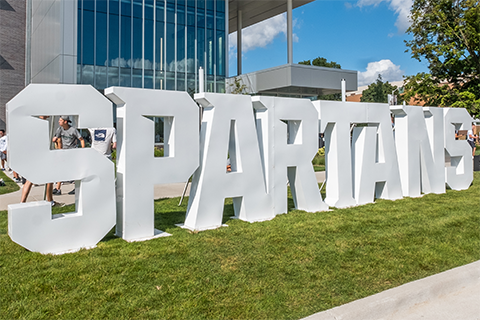Community and connection
Building community and connecting students to the resources, faculty, staff and peers to help them succeed is a large part of what we do at Michigan State University and the Office of Undergraduate Education.
The programs below are just some of what is available to connect students to the learning and living opportunities that best suit interest areas and needs.

Detachment 380 is an AFROTC (Air Force Reserve Officer Training Corps) training program based at Michigan State University in East Lansing, MI. Det. 380 also supports cadets from four nearby universities: Central Michigan University, Hope College, Lansing Community College, Olivet College, Thomas M. Cooley Law School, and Western Michigan University. The Cadet Corps includes nearly one hundred cadets from these five institutes of higher education.
AFROTC (Air Force Reserve Officer Training Corps) is a training program that prepares college students to become officers in the United States Air Force. Students work with Det. 380 to qualify for a commission in the Air Force while simultaneously completing their university undergraduate or graduate degree requirements.
Det. 380's educational training program emphasizes student involvement and the development of leadership skills. Classes are conducted as seminars and call for active student discussion. Additionally, cadets become involved in the management of their own cadet wing through a mandatory weekly two-hour "leadership laboratory." Cadets are assigned corps positions, with increasing responsibility over the four years. Students also participate in physical training, leadership projects, visits to Air Force bases, orientation flights, and normal college extracurricular activities.
MSU's Living-Learning residential options allow students who share similar academic interests or an interest in a multicultural living experience to live together in designated residence halls or on particular residence hall floors.
Participating in a living-learning option allows students to be part of a community of peers, faculty, and staff who share similar academic interests. You can find living-learning programs all over campus, serving students with a variety of social and academic interests.
Programs vary in size from Honors and James Madison at the college level, to BROAD, available only for the freshman year.
Did you know MSU provides a wide variety of graduate programs and certificates online?
The Online Programs website contains all relevant pre-application information for all of MSU’s online and hybrid graduate and certificate programs. Communicate with program directors, view course requirements, fees, length of the program, and more. This site contains everything you need to know about pursuing online education at MSU. Explore the wide variety of online graduate and certificate programs.
Detroit M.A.D.E. Scholars Program
The Detroit M.A.D.E. Scholars Program focuses on college transition, graduation and career development for students who have graduated from Detroit public and charter high schools who also reside in the city of Detroit. Learn more about program.
Pathways Persistence Programs
Bailey Scholars Program
At its core, BSP is a learning community where each student, graduate, and faculty fellow design their own learning journey and achieve whole person development. In this program, community members work towards fulfilling personal, professional, and academic goals. The program experience can be broken down into two main components: A minor in Leadership in Integrated Learning, and the Bailey Community itself.
Dow STEM Scholars Program
The Dow STEM Scholars Program provides academic and social support services to incoming MSU students (US Residents-Only), who want to pursue a STEM (Science, Technology, Engineering, or Mathematics) major and place into Intermediate College Algebra & Trigonometry – Math 103A on the MSU Math Placement Exam.
First-Generation Leadership & Innovation
First-Generation Leadership and Innovation (FLI) Vanderploeg Scholars program provides first-generation college students at MSU with access to opportunities to develop leadership skills and become innovators in their chosen field.
The Residential Initiative on the Study of the Environment (RISE)
RISE is an interdisciplinary living-learning program focused on sustainability and environmental stewardship. RISE provides first-year students at Michigan State University with the resources to successfully transition from high school to university academic life while they live and learn in Bailey Hall, located in the Brody neighborhood. Beyond their first year, many RISE participants are engaged in undergraduate research, hands-on projects, and co-curricular initiatives in which they can explore their interests within a supportive community of students, faculty and staff with shared values.
TRIO SSS Program
The TRIO SSS Program is for first-generation college students, those students whose parents have not completed undergraduate studies at a four-year university. The program also serves those who meet certain income criteria and students with documented disabilities. The program propels students at Michigan State University towards academic success and graduation.